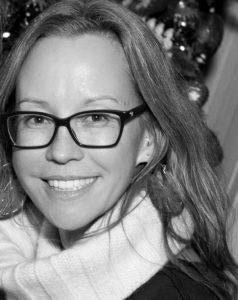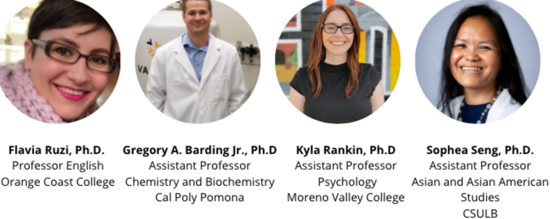Supporting Graduate Students' Academic and Professional Success

Are you pursuing a teaching role after your degree? Wondering how to get started on your job search journey into academia post graduate school? If so, then you may be getting ready to apply to academic positions. Well do not worry, the Graduate Student Resource Center has you covered. This month the GSRC hosted our 2022 After Grad: Teaching Careers Week where we hosted a variety of workshops, speakers, and panels. From finding an inner metaphor to guide your teaching to tips on how to prepare for the academic job market, the speakers had something for everyone. Below you can find a summary and important insights from each of the week's events.
TCW/TD Track: Supporting Long-Term Learning
In this session, we learned that memorization and learning techniques for two subjects, in this case art and ecology, can overlap. Instructors should know the difference between cooperative learning (working with others for a student’s own outcome) and collaborative learning (working with others for a group’s outcome). In addition, using images is a key method to facilitate learning, especially if students need to memorize written facts such as dates.
[Image Description: The words “You are never done learning” appearing one-by-one on a notebook page]
Pictured: Effective teachers are always open to learning new techniques!
Keynote Address: Beyond "Sage on the Stage" and "Guide on the Side": The Power of an Authentic Teaching Narrative
[Image Description: Dr. Barbara Junisbai looks at the camera and smiles]
Pictured: Dr. Barbara Junisbai, Associate Professor of Organizational Studies at Pitzer College
Kicking off this week was Dr. Barbara Junisbai. She spoke on the importance organizing the self and the brain to ensure one’s ability to teach effectively and with purpose. Dr. Junisbai talked about how to find an inner metaphor to help you stay moored to what you want to accomplish and remind you of what you enjoy about teaching in the first place. This strategy allows you to teach the way you teach best, and it begins with envisioning what learning looks like. During the session, participants described images and outcomes and then gave feedback on what others envisioned. From those images and outcomes, participants did some self-reflection and helped each other create metaphors for teaching that would fit their ideas of what happens in a classroom.
[Image Description: The words "Teaching Idea" below a flashing lightbulb]
Pictured: Your brain when you find your inner metaphor
Getting Hired: CSUs and Community Colleges Panel
[Image Description: Headshots of Dr. Flavia Ruzi, Dr. Gregory A. Barding Jr., Dr. Kyla Rankin, and Dr. Sophea Seng]
Pictured: Our "Getting Hired" panelists
This year we held a Getting Hired panel that was focused on CSUs and community colleges. We were joined by Dr. Flavia Ruzi (Professor of English at Orange Coast College), Dr. Sophea Seng (Assistant Professor Asian and Asian American Studies CSULB), Dr. Gregory Barding (Assistant Professor Chemistry and Biochemistry Cal Poly Pomona), and Dr. Kyla Rankin (Assistant Professor Psychology, Moreno Valley College). Together, the panelist highlighted the importance of reading job descriptions carefully, submitting letters of recommendation that can speak to your research experience, and extensively preparing for your interviews. For the community college hiring process, Dr. Ruzi highlighted that schools look for generalists who can demonstrate growth, flexibility, and the ability to teach a range of coursework. Additionally, these schools also seek candidates who can integrate the work that they have done during their doctoral program in their teaching and demonstrate that they can step away from a narrow research mindset. All of the panelists highlighted the importance of including teaching and writing positions in your CV. Another common theme was the need to read job descriptions very carefully so you can tailor your application materials. Your application documents, such as your personal statement, teaching philosophy, and diversity statement, should clearly reflect what the institution is asking for. Sometimes the terms they use might not even mean what you think they mean, so make sure you understand how institutions and departments understand terms such as “diversity” or “student success.” When applying to CSUs, Dr. Barding emphasized the importance of a Diversity, Equity, and Inclusion or a Student Success Statement. For many CSU hiring committees, it may be the first document that they are required to review.
Another thing that came up again and again is that you are learning so many wonderful skills and earning so many wonderful experiences that you are not aware will help you down the line. During the Getting Hired panel, Dr. Kyla Rankin emphasized that while she was TAing she was always learning “what works, what doesn’t work, what I can do to improve, and what I need to improve.” Dr. Flavia Ruzi talked about how teaching for five out of her six years at UCR really gave her the edge in her interview. At the same time, having broad teaching experience across different fields was something that truly helped Dr. Sophea Seng prepare for a department that was not a 1:1 with her own PhD background. Meanwhile, Dr. Gregory Barding emphasized that in the sciences the ability to communicate your science to the students is invaluable. Not all of these skills are things that may seem important in the moment, but in the end, they may prove vital to your teaching careers journey.
If you decide seeking a new job opportunity at a California community college is right for you, you can get the application process started by visiting cccregistry.org. This website provides services and resources for those seeking a job opportunity at one of the 112 colleges in the CCC system. Other hiring tool recommendations include the book The Professor Is In , the UCR Teaching Certificate Program , and the UCR Career Center.
[Image Description: Wile E. Coyote from Loony Tunes looks through binoculars while the words "Looking For A Job" pulse on an orange background.]
Pictured: Wile E. Coyote takes a very literal approach to job hunting
Writing an Effective Diversity Statement Workshop
This year Alexis Smith, the Coordinator of the UCR Graduate Writing Center, led us through the Writing an Effective Diversity Statement workshop. The purpose of a diversity statement is to demonstrate that you have the professional skills, personal and/or professional experience, and willingness to engage in activities that would enhance and proliferate diversity and equity efforts. Diversity statements give you the opportunity to highlight information and qualifications that have not been discussed elsewhere in your application. Your diversity statement can draw from your personal experience and background, research, teaching, service (in academia or beyond), and administrative work. Alexis reminded us to tailor each statement to the school you will be applying to. This will ensure that you align your diversity statement to your target institution's mission, student demographics, and goals. While the structure of diversity statements can vary, they typically include an introduction stating your values and your beliefs, a middle section that discusses relevant experiences, and a conclusion that sums everything up and presents how you'll continue your efforts at their institution. She recommends keeping your diversity statement to 1-2 pages unless told otherwise by the specific institutions that you are applying to. Alexis also recommends checking out the following resources as you work on your diversity statement: The Professor Is In, The Chronicle of Higher Education, and the UCR Graduate Writing Center.
[Image Description: Bernie Sanders aggressively pointing with one hand while the words “Our Diversity is one of our greatest strengths!” flash on the screen]
Pictured: A statement you might find in a university's mission or diversity statement!
Diversity Statement Clinic
Finally, we closed out the week with a Diversity Statement Clinic, where graduate students had the opportunity to bring a draft of their diversity statement to the clinic and work with Graduate Writing Center consultants to tailor their diversity statement to potential job applications.
[Image Description: A professor making the "okay" hand sign in front of a chalkboard]
Pictured: The feeling of satisfaction you get when you effectively tailor your diversity statement to fit a job description
And that's all, folks! To check out the recordings of this year’s After Grad: Teaching Careers Week events, please visit https://gsrc.ucr.edu/workshop-recordings .

